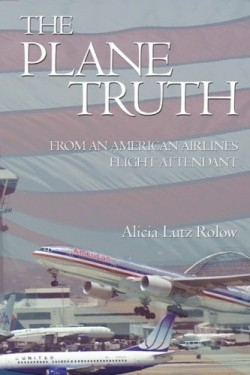The Plane Truth
Alicia Lutz Rolow has been a flight attendant for over three decades and she is angry. Not about her job—she loves her work the places she travels and the people she meets—but because she believes the corporate defenders of the bottom line at American Airlines are neglecting fleet updating maintenance issues and security. Addressed to both her fellow employees and potential passengers The Plane Truth is her plea to make air travel safer.
“I am not a novelist or a professional book writer” Rolow admits but her opening chapter is affecting. It’s a letter to Amy Sweeney an American Airlines flight attendant who died when AA Flight 11 crashed headlong into the World Trade Center. Readers can see from the opening sentence that Rolow is frustrated but it is not until chapter seven that she makes clear the impetus for her outrage:
““As far as American Airlines and United Airlines are concerned no one will ever be able to convince me that both of these airline’s corporate management officials were not privy to firsthand information that could have changed the outcome of the horrible events that took place on September 11th 2001 had they just provided those flight crew members with the warnings that they deserved and had every right to be given before they took flight.””
These are impassioned words—nearly libelous some might say. The author’s repeated use of boldface type on many of the book’s 400 pages of is a risky choice implying that words not displayed so dramatically are less important. It also makes the text difficult to decipher a problem made worse by lack of paragraphing.
Rolow blames American Airlines’ management particularly CEO Gerald J. Arpey. The author is incensed at a near 20 million bonus package shared among Arpey and other top executives in 2007 after management had negotiated “concessions and sacrificing.” But Arpey isn’t the only villain; Rolow also condemns the airline’s former president Robert Crandall.
Simply put Rolow believes that American Airlines is mismanaged and she doesn’t confine her criticism to those with corner offices. She notes that some of her contemporaries have “absolutely no business flying the Purser position” because they have been “beaten down” by management. She is especially critical of many in middle management such as flight service managers.
Should readers close The Plane Truth and resolve never to fly again? The United States despite bureaucratic fits and fumbles has a remarkably safe and sophisticated air transportation network. Rolow argues that its safety record comes about by the grace of God rather than by intelligent design.
By the time this book was written Rolow had been suspended for “insubordination”; she refused to crew a flight she considered unsafe. She is an expert witness but the book seems a screed albeit an interesting one.
From the “who knew?” tidbits Rolow includes readers will learn that generous amounts of commercial airliner maintenance is outsourced overseas. They’ll also receive comical insight into the TSA’s screening of airline crews.
The Plane Truth may be an accurate assessment but its impact is lessened by its complaining tone.
Reviewed by
Gary Presley
Disclosure: This article is not an endorsement, but a review. The publisher of this book provided free copies of the book and paid a small fee to have their book reviewed by a professional reviewer. Foreword Reviews and Clarion Reviews make no guarantee that the publisher will receive a positive review. Foreword Magazine, Inc. is disclosing this in accordance with the Federal Trade Commission’s 16 CFR, Part 255.

